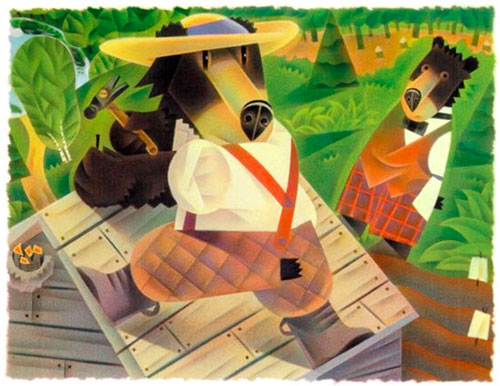How to Get Rich: Paul Graham on Money vs. Wealth
Debunking the pie fallacy, or why there’s more to success than giving people what they want....MUCH MORE
“The moral challenge and the grim problem we face,” Alan Watts argued in his superb 1970 essay on the difference between money and wealth, “is that the life of affluence and pleasure requires exact discipline and high imagination.” Hardly anywhere is this urgency manifested more vibrantly than in startup culture. So argues English programmer and writer Paul Graham — who went to art school studying painting after finishing grad school in computer science, and whose timelessly wonderful meditation on prestige vs. purpose remains a must-read — in an essay titled “How to Make Wealth,” found in the 2004 anthology Hackers & Painters: Big Ideas from the Computer Age (public library). Echoing Watts, Graham defines a startup as “a way to compress your whole working life into a few years” and begins his exploration of “how to make money by creating wealth and getting paid for it” with an essential distinction between the two:
If you want to create wealth, it will help to understand what it is. Wealth is not the same thing as money. Wealth is as old as human history. Far older, in fact; ants have wealth. Money is a comparatively recent invention.Wealth is the fundamental thing. Wealth is stuff we want: food, clothes, houses, cars, gadgets, travel to interesting places, and so on. You can have wealth without having money. If you had a magic machine that could on command make you a car or cook you dinner or do your laundry, or do anything else you wanted, you wouldn’t need money. Whereas if you were in the middle of Antarctica, where there is nothing to buy, it wouldn’t matter how much money you had.
Wealth is what you want, not money. But if wealth is the important thing, why does everyone talk about making money? It is a kind of shorthand: money is a way of moving wealth, and in practice they are usually interchangeable. But they are not the same thing, and unless you plan to get rich by counterfeiting, talking about making money can make it harder to understand how to make money.Money is a side effect of specialization. In a specialized society, most of the things you need, you can’t make for yourself. If you want a potato or a pencil or a place to live, you have to get it from someone else.Unlike Buckminster Fuller, who saw specialization as a social evil, Graham considers it the natural progression of an exponentially advancing society. It first gave rise to trade between specialized forms of wealth (e.g., my homegrown tomatoes for your carpentry), then eventually sparked the creation of an intermediate stage — money (my tomatoes for a shilling, a shilling for your carpentry). Somewhere along the way, Graham argues, we lost sight of the fact that money is just an intermediary. He writes:Illustration from 'Henry Builds a Cabin,' a children's book about Thoreau's philosophy. Click image for more.
People think that what a business does is make money. But money is just the intermediate stage — just a shorthand — for whatever people want. What most businesses really do is make wealth. They do something people want.From this, in turn, stems one of the most toxic fallacies we subscribe to — something legendary graphic designer Milton Glaser so eloquently debunked in considering the manifestable kindness of the universe. Graham writes of “the pie fallacy”:
A surprising number of people retain from childhood the idea that there is a fixed amount of wealth in the world. There is, in any normal family, a fixed amount of money at any moment. But that’s not the same thing. When wealth is talked about in this context, it is often described as a pie. “You can’t make the pie larger,” say politicians…What leads people astray here is the abstraction of money. Money is not wealth. It’s just something we use to move wealth around. So although there may be, in certain specific moments (like your family, this month) a fixed amount of money available to trade with other people for things you want, there is not a fixed amount of wealth in the world. You can make more wealth. Wealth has been getting created and destroyed (but on balance, created) for all of human history.
HT: AlphaIdeas links post
